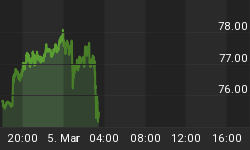Through its rhetoric and actions, the Obama Administration has made it clear that no matter the current or future costs, the federal government will not allow a collapse of the banking system. The resulting aura of certitude has, in turn, encouraged investors to roll the dice one more time. Some of these investors are likely trying to make good prior investment losses through speculative trading in U.S. equities. The surety of the government guarantee has sadly allowed them to overlook the fact that U.S. corporate earnings continue to fall.
So, as is the case with all government guarantees, the risks our economy faces are now disproportionate to the opportunities. Haven't we been down this road before?
The operative question remains whether the government can reward the current round of investment by averting an economic depression. If not, what is the justification for investing in U.S. equities or high-yielding corporate bonds?
Given that the majority of government spending is on corporate bailouts and social programs, rather than infrastructure improvement, I would argue that the odds of recovery are long.
Economists broadly agree that greater economic bang for the buck is achieved through infrastructure spending. It is surmised that for every $10 billion spent on infrastructure, some 35,000 real, wealth-creating jobs are created. Therefore, a government spending $1 trillion should create some 3.5 million new jobs.
When President Eisenhower, the last big spender on infrastructure, left office in 1961, infrastructure amounted to some 12 percent of federal spending. The ensuing generations have neglected such spending in favor of wealth transfers and efforts to control social development. Today, only some 2.5 percent of the federal budget goes towards infrastructure.
Mainly as a result of pre-Vietnam spending, 21st century America has a huge inheritance of bridges, roads, dams, river levees, and water and sewerage systems. Most of them were built between 1930 and 1960. Some are even older. Of those built in the 1930's and 1940's, many were made with inferior materials and are now in chronic need of repair or replacement. The estimate of total urgently needed infrastructure investment to bring these aging assets up to snuff is some $1 trillion, or 3.5 million jobs.
However, the Administration continues to pursue a socialist-style dogma of investing massively in entitlement programs, such as health ($1.6 trillion), education ($0.7 trillion), and so-called "clean" energy ($1.3 trillion). While these investments will create employment, the jobs will be wealth-consuming.
Meanwhile, America's main economic challengers, China and India, plan to increase their allocation of government spending on infrastructure from their present 9 percent levels. This means that wealth-creating jobs will be created in those countries, making their national finances, workers and economies even more competitive with America and increasingly likely to precede America out of recession.
In addition, the vast increase in the issuance of U.S. Treasury debt is raising further serious, not to say embarrassing, questions as to America's credit rating, its ability to continue borrowing on such a massive scale, and the value of its dollar. It is also crowding out viable American corporations from access to debt finance, putting a further break on the job creation and consumer demand that is vital for economic recovery.
A cruelly efficient free-market answer to these issues could cause tremendous acute trauma to the average American, which makes proposals of this type political non-starters. The alternative is measures like the recent move to give the Federal Reserve power to force American banks to lend to less-than-credit-worthy borrowers. But this path is on par with selling one's soul to the devil: you may solve your current crisis, but the future consequences are disproportionately severe.
In light of these alternatives, investors in the U.S. stock or high-yield bond markets are not making prudent, long-term investments, but rather short-term, speculative bets.
If the heavy infrastructure spending by China and India lift the world economy out of the threatening depression, "green shoots" are most likely to sprout in the BRIC economies and those of their raw material suppliers. Those looking to recoup the devastating losses of 2008 would be far better served placing bets there.
For a more in-depth analysis of our financial problems and the inherent dangers they pose for the U.S. economy and U.S. dollar, read Peter Schiff's newest book "The Little Book of Bull Moves in Bear Markets." Click here to order your copy now.
For a look back at how Peter predicted our current problems read the 2007 bestseller "Crash Proof: How to Profit from the Coming Economic Collapse." Click here to order a copy today.
More importantly, don't wait for reality to set in. Protect your wealth and preserve your purchasing power before it's too late. Discover the best way to buy gold at www.goldyoucanfold.com. Download Euro Pacific's free Special Report, "Peter Schiff's Five Favorite Investment Choices for the Next Five Years", at http://www.europac.net/report/index_fivefavorites.asp. Subscribe to our free, on-line investment newsletter, "The Global Investor" at http://www.europac.net/newsletter/newsletter.asp. And now watch the latest episode of Peter's new video blog, "The Schiff Report", at http://www.europac.net/videoblog.asp.















